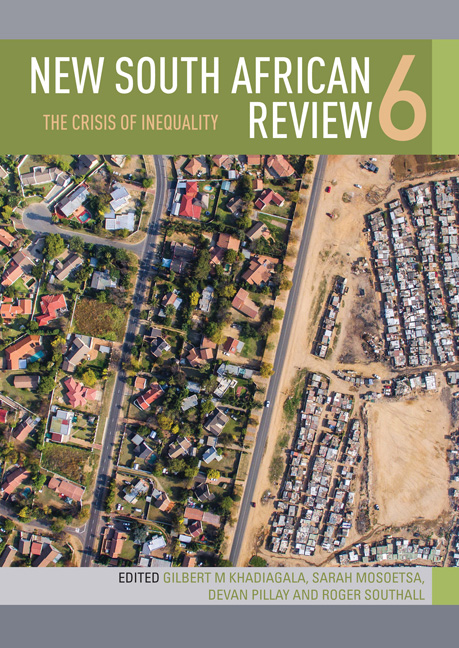Book contents
- Frontmatter
- Contents
- List of tables and figures
- INTRODUCTION: The global crisis of inequality and its South African manifestations
- PART 1 INEQUALITY AND CLASS: POLARITIES AND POLICIES
- CHAPTER 1 Inequality in South Africa
- CHAPTER 2 A national minimum wage in South Africa: A tool to reduce inequality?
- CHAPTER 3 The politics of poverty and inequality in South Africa: Connectivity, abjections and the problem of measurement
- CHAPTER 4 The financialisation of the poor and the reproduction of inequality
- PART 2 THE POLITICS OF INEQUALITY
- PART 3 SOCIAL DIMENSIONS OF INEQUALITY
- PART 4 LAND AND ENVIRONMENT
- Contributors
- Index
CHAPTER 2 - A national minimum wage in South Africa: A tool to reduce inequality?
from PART 1 - INEQUALITY AND CLASS: POLARITIES AND POLICIES
Published online by Cambridge University Press: 23 March 2018
- Frontmatter
- Contents
- List of tables and figures
- INTRODUCTION: The global crisis of inequality and its South African manifestations
- PART 1 INEQUALITY AND CLASS: POLARITIES AND POLICIES
- CHAPTER 1 Inequality in South Africa
- CHAPTER 2 A national minimum wage in South Africa: A tool to reduce inequality?
- CHAPTER 3 The politics of poverty and inequality in South Africa: Connectivity, abjections and the problem of measurement
- CHAPTER 4 The financialisation of the poor and the reproduction of inequality
- PART 2 THE POLITICS OF INEQUALITY
- PART 3 SOCIAL DIMENSIONS OF INEQUALITY
- PART 4 LAND AND ENVIRONMENT
- Contributors
- Index
Summary
Rising inequality, in recent decades, has opened new spaces for research into its causes and consequences, drawing attention to new and established inequality-reducing policy measures, with inequality-enhancing labour market policies receiving renewed interest. Minimum wages are one such policy measure.
Current levels of global inequality are staggering. In 2016, Oxfam calculated that in the preceding five years the wealth of the sixty-two richest individuals rose by 45 per cent, whereas the wealth of the least wealthy half of the world's population dropped by 38 per cent (Oxfam 2016). The income shares of top earners are high in both developed and developing countries. In Colombia and Argentina the top 1 per cent take home approximately 20 per cent of total wage earnings (UNDP 2014); in South Africa this is a staggering 40 per cent (Finn 2015). Some developing countries have managed to reduce inequality – Brazil halved its top to bottom inequality in the 1990s and 2000s, the ratio between the top and bottom 10 per cent narrowing from around fourteen times to seven times (OECD 2011). It is increasingly recognised that extreme inequality is not only unethical but also destabilising and growth retarding, whereas long-run benefits accrue from reducing inequality (Berg and Ostry 2011; OECD 2014).
Changes in pay structure, paid employment and market flexibility, and a decline in trade union membership play important roles in explaining wage inequality (Dabla-Norris et al. 2015; OECD 2015). Where incomes have risen in emerging and developing economies, wage-income growth has played a leading role in inequality reduction. In Argentina and Brazil, wage compression accounted for 87 per cent and 72 per cent of the reduction of top-bottom inequality respectively. Similarly, wage compression, rather than changes in employment, drove inequality reduction in Peru and Russia (ILO 2015).
Over the past three decades, labour shares (the share of value added distributed as wages) have fallen globally (in both developed and developing countries), an important factor in determining overall trends in inequality. Between 1990 and 2006, the labour share in a group of sixteen developing countries declined from 62 per cent of gross domestic product (GDP) to 58 per cent (ILO 2013).
- Type
- Chapter
- Information
- New South African Review 6The Crisis of Inequality, pp. 43 - 65Publisher: Wits University PressPrint publication year: 2018



